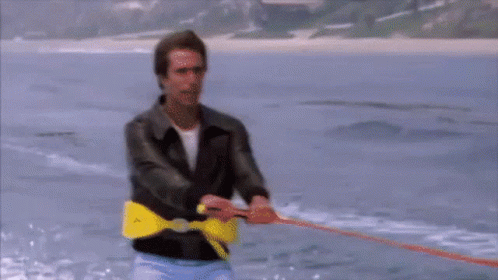Carry On... #jumping the shark
Please note that this week's film has been rated 15 in the UK.
In 1977, an episode of the American television series Happy Days (which at that point had been running for five successful seasons) featured a scene in which the Fonz (remember him? Cool dude in the leather jacket?) jumps over a live shark on water-skis (to clarify: Fonzie, not the shark, is on the water-skies, although I don't think it matters all that much).
The stunt has gone down in television history as the moment at which Happy Days demonstrated it was prepared to do absolutely anything to revive its flagging ratings. Happy Days had been conceived in the 1970s as a feel-good exercise in nostalgia for Baby-Boomers who had fond memories of their own teenage years in the 1950s. The Fonz jumping over a shark marked the point at which the series stopped being about anything other than a cynical attempt to draw viewers back to a franchise that had begun to stagnate.
In the subsequent decades, the phrase "jumping the shark" has come to refer to the moment in any television show when it sacrifices its own identity and values for the sake of ratings.
It should be noted that memories of The Fonz and his shark-jumping moment are beginning to grow dim (this was almost fifty years ago) and more hip and happening observers of popular culture have begun to favour the phrase "nuking the fridge". But that's a discussion for another time.
Of course "jumping the shark" is one of those ideas that only makes sense in hindsight. No one could possibly have predicted that a television network would be so rabidly hungry for ratings at any cost that it would sacrifice standards, ethics, even basic common decency, all for the sake of ratings.
Right?
Network tells the story of Howard Beale, a veteran news reporter with a long and distinguished career who is fired by his network after his ratings begin to drop.
When he has a very public meltdown on live television, the studio executives realise they have an asset they can weaponise.
Written with savage fury by Paddy Chayefsky, Network may possibly be one of the most uncomfortably prescient films about the television industry ever written. The most disturbing aspect of Network is that (almost) everything that is portrayed in the film has subsequently come to pass.
When George Clooney was considering the possibility of producing a remake some thirty years later (a remake that never actually happened) he organised a private screening of the 1976 original for a group of millennial teenagers and young adults.
Not one of them recognised that this film was meant to be a satire.
Network also proved to be the final film of Peter Finch, who became the first actor to win a posthumous Academy Award. The film was nominated for ten Oscars in total, and won four, although I personally think that two of the best performances in the film did not win.
Like last week's A Face in the Crowd, Network has a great deal to say about the impact television was having on society itself. When high ratings become the only measure for success, trumping ethics, journalistic standards, even truth itself, then "jumping the shark" is no longer an anomaly. It becomes inevitable.
To maintain their audience share, to keep people from switching to another channel, to keep viewers from asking too many questions about what they are being fed, television networks are always going to jump the shark.
We will screen Network at 7.30pm on Thursday, the 28th of September at the Victoria Park Baptist Church.














Comments
Post a Comment